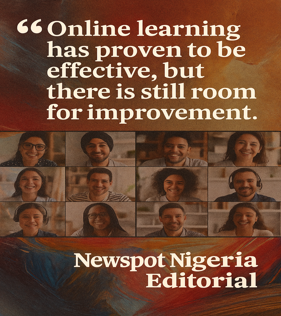“Online learning works when it is carefully planned, supported by reliable technology, and guided by committed teachers.”
When COVID-19 shut schools, more than 1.6 billion learners worldwide had to rely on online classrooms. Many Nigerians doubted whether this new way of learning could truly work. A new study now shows that it not only works but also holds power to reshape education. For Nigeria, this is an opportunity we cannot ignore.
Between May and August 2025, researchers Marsha Watson-Hylton and Abidemi Adebamiwa at Claremont Graduate University studied learners in the United States and South Africa. Students gave online programs strong ratings, averaging 4.3 out of 5 for satisfaction and 4.2 for learning gains. These scores show that online programs deliver knowledge and confidence effectively. The findings add weight to the case for expanding digital learning.
The stories behind the numbers show why the results matter. In South Africa, one learner managed family, work, and study thanks to flexible scheduling. In the US, another learner applied new skills at work and earned a promotion. These examples prove that online learning is not just about passing courses but about real change in people’s lives.

The study also revealed challenges that cannot be ignored. Students mentioned delayed feedback from teachers, unreliable internet, and feelings of isolation. These barriers affect how well online programs serve their students. They are gaps that Nigeria must address if it wants digital learning to succeed.
The researchers gave clear recommendations based on what they found. Courses should remain flexible but provide faster teacher feedback. Institutions must invest in stronger technology and design lessons that connect with real-world needs. Online communities where students can interact and support each other are also essential.
For Nigeria, the stakes are especially high. Over 18 million children are still out of school, the highest number in the world. Girls make up most of this figure, and rural children walk long distances to overcrowded classrooms. Online learning could be the bridge that changes this dire reality.
The findings prove that online education can provide value quickly. More than half of the learners in the study said they used their new skills directly in work or school. These results show that carefully designed online programs produce outcomes equal to or better than face-to-face learning. What matters most is the quality of planning and support.
The researchers also suggest the next steps for building stronger evidence. Future studies should include more countries, follow learners over longer periods, and use interviews or focus groups to capture deeper experiences. While this will take more money and time, it will show how to make online learning even more effective. For now, the evidence is already strong enough to act.
Online education works when it is carefully planned, supported with reliable technology, and guided by committed teachers. It offers flexibility, builds skills, and opens doors to better careers and learning opportunities. Nigeria now has the chance to use this proven model to reach millions who have been left behind. With determination, this can become a turning point for the nation’s future.
Newspot Nigeria will continue to follow how the work of Watson-Hylton and Adebamiwa shapes this important debate on education.
–Newspot Nigeria
Stay ahead with the latest updates!
Join The Podium Media on WhatsApp for real-time news alerts, breaking stories, and exclusive content delivered straight to your phone. Don’t miss a headline — subscribe now!
Chat with Us on WhatsApp





